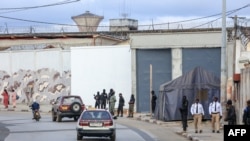Police in Gabon say a crime wave has hit the capital, Libreville, several days after the country’s transitional president pardoned and set free over 500 prisoners. Civil society groups on Tuesday launched a campaign asking the government to give the former prisoners more support and for freed prisoners to be law-abiding citizens.
General Jean Germain Effayong Onong, commander in chief of Gabon's Penitentiary Administration, told Gabon's state TV that former prisoners caught committing crimes will either be punished or sent back to prison.
Onong said the country's transitional government led by General Brice Clotaire Oligui Nguema wants civilians to live in peace with total freedom to carry out their daily activities.
Onong spoke about a week after the government set free more than 560 of the close to 4,000 inmates at the Libreville Central Prison.
In December, President Oligui, who seized power from President Ali Ben Bongo following a disputed election last August, promised to set free over 1,000 prisoners. He said most were civilians were unjustifiably held in prison by Gabon's former leaders. The general said a majority of prisoners were held in pretrial detention for a long time with no evidence of wrongdoing.
The presidential pardon did not extend to prisoners who had been convicted of drug-related offenses or violent crimes.
However, Gabon's police this week reported that many people who regained freedom following the presidential clemency have been arrested for involvement in crimes such as theft, assault and highway robbery.
Firman Ollo'o Obiang is secretary general of S.O.S Prisoners, a non-governmental organization that works for the well-being of Gabon's inmates.
Obiang said it is very surprising that less than two weeks after regaining freedom, former prisoners whose liberation was hard earned are again arrested by the police for committing crimes. Obiang said while waiting for families and the government to socially and economically reintegrate the freed prisoners, his organization is providing moral and financial assistance to poor and unemployed civilians who were freed by Gabon's transitional government.
Obiang did not say how much financial assistance S.O.S Prisoners provides to the freed inmates.
Rights groups and S.O.S Prisoners blame unemployment, the high cost of living and poverty for the crime wave reported by Gabon police.
They also say if prisons in Gabon were the correctional facilities they are supposed to be, freed prisoners would not be involved with crime.
Stanislas Kouma is Gabon's director general of penitentiary affairs.
Kouma said Gabon's transitional government is planning to improve living conditions of inmates while in prison and when the inmates eventually regain their freedom. He said conditions deteriorated during ousted president Ali Bongo Ondimba's term in office.
Kouma said Gabon's central prison in Libreville, constructed for less than a thousand inmates, had about 4.000 detainees when General Oligui seized power in an August 30 coup.
Shortly after the coup, President Oligui freed several political prisoners who had jailed for years without trial.
Included in that release were Jean-Remy Yama, leader of the Coalition of Gabon State Workers Trade Unions, Renaud Allogho Akoue, former director general of Gabon's National Social Insurance and Health Fund, and Léandre Nzué, former mayor of Gabon's capital, Libreville.
Hundreds more less prominent prisoners pardoned by Oligui are scheduled to be released by the end of April.





